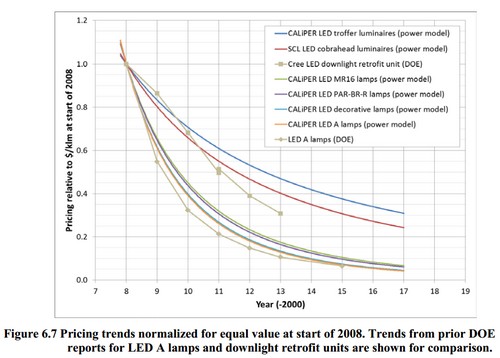The U.S. Department of Energy (DOE) has published a new report, SSL Pricing and Efficacy Trend Analysis for Utility Program Planning. The report was created in response to requests from utilities and energy efficiency organizations for information to help them forecast the order in which important SSL applications will become cost-effective and estimate when each “tipping point” will be reached. It includes performance trend analysis from DOE's LED Lighting Facts® and CALiPER programs, plus cost analysis from various sources.
Application-specific projections provide time for planning, enable prioritization by application or product category, inform delivery and education approaches, and allow estimation of energy savings potential and appropriate incentive levels to overcome price barriers.
 |
|
Some of the pricing trends findings in the DOE report. (LEDinside/ DOE) |
Among the key findings:
-
Average efficacy for LED lamps and LED luminaires is projected to remain well below L Prize® and DOE SSL R&D Multi-Year Program Plan thresholds through 2017, but given the high variability among products and the performance potential of new color-mixing technologies, these goals might soon be met by leading products.
-
In several key LED product categories (omnidirectional lamps, decorative lamps, downlight luminaires, and troffer luminaires), projected efficacies based on LED Lighting Facts listings are substantially higher than projections based on the corresponding ENERGY STAR® or DesignLights Consortium® listings.
-
LED lamp $/klm pricing is expected to decrease roughly 55 percent by 2017, relative to current pricing. A more modest decrease of 30 percent is projected for LED luminaires over this same period.
The report is intended to serve as a starting point—to be updated, detailed, and expanded in subsequent reports as appropriate, based on input from utilities and energy efficiency organizations. It is available for download under Lighting Market Characterization Studies.












